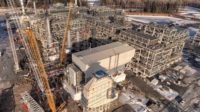Mallory also noted Baker’s “performance improvement plan” to reduce costs by $18 to 20 million in 2013, including 130 workforce staff cuts completed by last month. “We’re looking at the new normal, we have to have a lower cost structure,” he said.
While Mallory noted the firm would curtail acquisitions to focus on organic growth, company sources not authorized to speak publicly say integration problems with LPA and RBF still remain.
“They spent a ton and aren't seeing return on investment," says one employee who requested anonymity. "They are just setting themselves up to be bought, which is never what they wanted."
Mallory told analysts that with the cost-cutting and "dramatically" improved performance in 2013, Michael Baker could "be in the vicinity" of one of its best performances in recent years. But failing to achieve that, "a lot of fair questions will need to be asked."
Wall Street analysts speculate on Baker’s challenges in being public at its revenue size.
“They have to compete with the URSs and AECOMs that are 10 to 15 times their size as well as privately held firms that don’t have some of the burdens of being publicly traded, so going private is a sensible alternative if shareholders get the right price," says Steven Gido, a principal at Boston financial management firm Rusk O'Brien Gido & Partners.
Gido is not clear on the potential synergy between Baker and DC Capital’s KSI unit, and speculates that an international buyer could still be in the mix of potential acquirers.
But according to one former company executive who declined to be identified, “the board is fiercely against going private.”
Paul Zofnass, president of industry M&A and financial consulting firm EFCG Inc. notes that it can be tricky as well to go private, with firms facing new debt problems, particularly in financing employee investor retirement payouts.
But the firm has underperformed in some key areas compared to 22 other publicly-held engineer-consultant peers and Standard & Poor's averages, he says.
Afzal says Michael Baker's "underlying value is good. The big question is: what is happening?"
Gido adds that while he is unclear as to the exact details of Mallory's departure, "it happens frequently where a board gets investor pressures, Wall Street and analyst pressures, results aren’t great, etc. and CEOs are shown the door."
He says that, as the firm's former chief operating officer, Mallory "had good working knowledge of the organization before taking the reins. It’s been a tough climate in the last few years."
The former Baker executive speculates that the board may appoint as new CEO, the firm's current Executive Vice President G. John Kurgan, a 37-year company veteran who was named chief operating officer last year.
Says Gido, “the CEO search could be tricky….you need someone from industry with experience in public-sector company issues as well as dealing with outside investor pressures and some turnaround expertise. They really need a change agent to compete and shake things up."
Some insiders point to the continuing strong influence of Shaw, Baker’s chairman since 1991 who was CEO for for about a decade starting in 1984 and has been with the firm since 1958. Mallory was the firm's fourth CEO since Shaw.
“Dick has had an iron grip on this company and I suspect nothing will change until he retires,” says the former executive.





Post a comment to this article
Report Abusive Comment